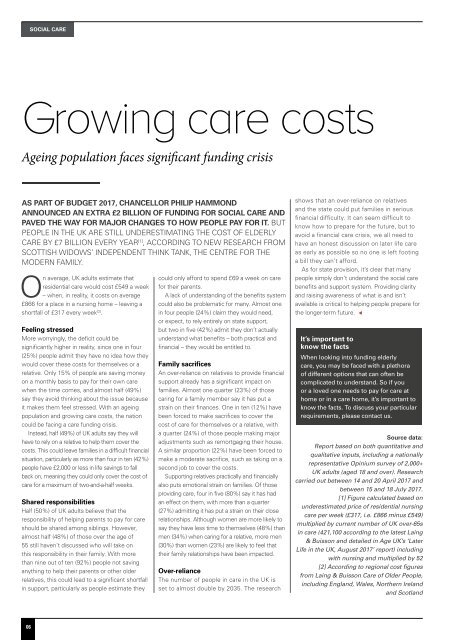Beaumont-Briefing-November-December-17
Create successful ePaper yourself
Turn your PDF publications into a flip-book with our unique Google optimized e-Paper software.
SOCIAL CARE<br />
Growing care costs<br />
Ageing population faces significant funding crisis<br />
AS PART OF BUDGET 20<strong>17</strong>, CHANCELLOR PHILIP HAMMOND<br />
ANNOUNCED AN EXTRA £2 BILLION OF FUNDING FOR SOCIAL CARE AND<br />
PAVED THE WAY FOR MAJOR CHANGES TO HOW PEOPLE PAY FOR IT. BUT<br />
PEOPLE IN THE UK ARE STILL UNDERESTIMATING THE COST OF ELDERLY<br />
CARE BY £7 BILLION EVERY YEAR [1] , ACCORDING TO NEW RESEARCH FROM<br />
SCOTTISH WIDOWS’ INDEPENDENT THINK TANK, THE CENTRE FOR THE<br />
MODERN FAMILY.<br />
On average, UK adults estimate that<br />
residential care would cost £549 a week<br />
– when, in reality, it costs on average<br />
£866 for a place in a nursing home – leaving a<br />
shortfall of £3<strong>17</strong> every week [2] .<br />
Feeling stressed<br />
More worryingly, the deficit could be<br />
significantly higher in reality, since one in four<br />
(25%) people admit they have no idea how they<br />
would cover these costs for themselves or a<br />
relative. Only 15% of people are saving money<br />
on a monthly basis to pay for their own care<br />
when the time comes, and almost half (49%)<br />
say they avoid thinking about the issue because<br />
it makes them feel stressed. With an ageing<br />
population and growing care costs, the nation<br />
could be facing a care funding crisis.<br />
Instead, half (49%) of UK adults say they will<br />
have to rely on a relative to help them cover the<br />
costs. This could leave families in a difficult financial<br />
situation, particularly as more than four in ten (42%)<br />
people have £2,000 or less in life savings to fall<br />
back on, meaning they could only cover the cost of<br />
care for a maximum of two-and-a-half weeks.<br />
Shared responsibilities<br />
Half (50%) of UK adults believe that the<br />
responsibility of helping parents to pay for care<br />
should be shared among siblings. However,<br />
almost half (48%) of those over the age of<br />
55 still haven’t discussed who will take on<br />
this responsibility in their family. With more<br />
than nine out of ten (92%) people not saving<br />
anything to help their parents or other older<br />
relatives, this could lead to a significant shortfall<br />
in support, particularly as people estimate they<br />
could only afford to spend £69 a week on care<br />
for their parents.<br />
A lack of understanding of the benefits system<br />
could also be problematic for many. Almost one<br />
in four people (24%) claim they would need,<br />
or expect, to rely entirely on state support,<br />
but two in five (42%) admit they don’t actually<br />
understand what benefits – both practical and<br />
financial – they would be entitled to.<br />
Family sacrifices<br />
An over-reliance on relatives to provide financial<br />
support already has a significant impact on<br />
families. Almost one quarter (23%) of those<br />
caring for a family member say it has put a<br />
strain on their finances. One in ten (12%) have<br />
been forced to make sacrifices to cover the<br />
cost of care for themselves or a relative, with<br />
a quarter (24%) of those people making major<br />
adjustments such as remortgaging their house.<br />
A similar proportion (22%) have been forced to<br />
make a moderate sacrifice, such as taking on a<br />
second job to cover the costs.<br />
Supporting relatives practically and financially<br />
also puts emotional strain on families. Of those<br />
providing care, four in five (80%) say it has had<br />
an effect on them, with more than a quarter<br />
(27%) admitting it has put a strain on their close<br />
relationships. Although women are more likely to<br />
say they have less time to themselves (48%) than<br />
men (34%) when caring for a relative, more men<br />
(30%) than women (23%) are likely to feel that<br />
their family relationships have been impacted.<br />
Over-reliance<br />
The number of people in care in the UK is<br />
set to almost double by 2035. The research<br />
shows that an over-reliance on relatives<br />
and the state could put families in serious<br />
financial difficulty. It can seem difficult to<br />
know how to prepare for the future, but to<br />
avoid a financial care crisis, we all need to<br />
have an honest discussion on later life care<br />
as early as possible so no one is left footing<br />
a bill they can’t afford.<br />
As for state provision, it’s clear that many<br />
people simply don’t understand the social care<br />
benefits and support system. Providing clarity<br />
and raising awareness of what is and isn’t<br />
available is critical to helping people prepare for<br />
the longer-term future. t<br />
It’s important to<br />
know the facts<br />
When looking into funding elderly<br />
care, you may be faced with a plethora<br />
of different options that can often be<br />
complicated to understand. So if you<br />
or a loved one needs to pay for care at<br />
home or in a care home, it’s important to<br />
know the facts. To discuss your particular<br />
requirements, please contact us.<br />
Source data:<br />
Report based on both quantitative and<br />
qualitative inputs, including a nationally<br />
representative Opinium survey of 2,000+<br />
UK adults (aged 18 and over). Research<br />
carried out between 14 and 20 April 20<strong>17</strong> and<br />
between 15 and 18 July 20<strong>17</strong>.<br />
[1] Figure calculated based on<br />
underestimated price of residential nursing<br />
care per week (£3<strong>17</strong>, i.e. £866 minus £549)<br />
multiplied by current number of UK over-65s<br />
in care (421,100 according to the latest Laing<br />
& Buisson and detailed in Age UK’s ‘Later<br />
Life in the UK, August 20<strong>17</strong>’ report) including<br />
with nursing and multiplied by 52<br />
[2] According to regional cost figures<br />
from Laing & Buisson Care of Older People,<br />
including England, Wales, Northern Ireland<br />
and Scotland<br />
06
















